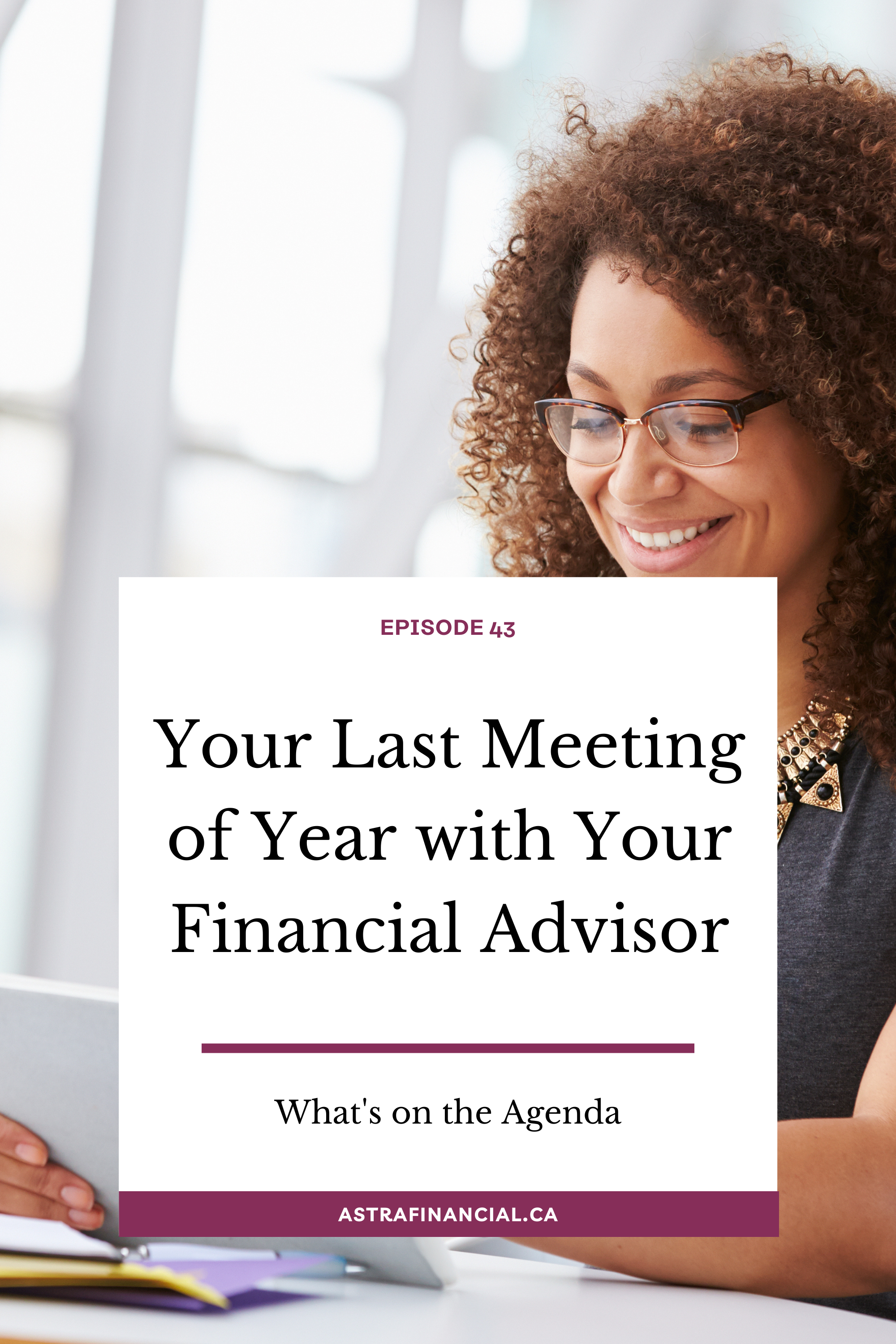Episode 43 – Your Last Meeting of Year with Your Financial Advisor

It’s almost the end of the year! Are you ready for your last meeting of the year with your financial advisor?
In Episode 43 of “The Heart of Your Money,” I cover everything you should take into consideration for this meeting, and why it’s important.
Show Notes:
Hey there, and welcome back. This is episode 43. And today, I’m going to get you thinking about the end of year check-in with your financial planner. As I’m making the calls this week in our office and meeting with people online or in person. Oh, that damn COVID is still here. A few things come to mind, and I’m going to share them with you.
It’s the topics and items you should be checking off when you’re meeting with your planner coming up right away. First thing, it’s the end of the year. During that meeting with your planner, a question will be how was the performance in our investments? It’s been a great year for recovery in funds, and you should see growth this year.
And that’s where you’re going to take a look. Ask, is the allocation correct? Is your risk tolerance still on check? Just talk about your timeline. This is going to be reviewing to see if you’re on track and if it’s matching your financial plan strategy because if you’ve been listening, you know, I preach everybody has to have a bit of a flight plan.
You’ve got to have a strategy in place. We can’t be making decisions in the dark, and you’re going to want to see are we on track? For example, did you make your 2021 savings goal? You still have time. And that’s why it’s so important for this check-in to see if you’re on track. You can pull up that plan, do a check.
Is it relevant? The investment rate of returns? Is it still there? And please tell me that you’re not chasing a return, like a positive seven, positive eight, positive nine, even a positive six percent rate of return in your retirement planning. Are you probably going to get it with a really good financial planner and your allocation investment strategy?
Yeah, you probably will. But should you plan on that amount? No. I want to see a plan that shows a Debbie downer and then a very conservative return. No more than five. But that’s where you’re going to take a look and see. Are you on track? There should be a conversation if you have a negative right now. Okay. Let’s review. Let’s take a look. Why, what are we looking at? So also any big changes happening in your life. This is the time to talk about.
The next question in a meeting I asked clients is how is the cash flow? Is there enough coming in as there is going out? Do you still have cash on hand for your emergency fund, or have you spent it? You can prepare for this by quickly going through your bank accounts before the meeting, taking a look at your spending and just giving a look and seeing give thought to any big end of your costs. And I bring that up because Christmas is coming, and sometimes it can catch us by surprise.
So this is just really reviewing your cash flow, going through and seeing if there are any alarm bells. And if you need to revamp up some savings, you’re going to need to know that for the new year.
Another question – if you have kids and they’re young, and one of the things is the education savings plans, you can get your free $500 from the government. I laugh. Okay. Is it really free? Should we have a tax conversation? Doesn’t matter; move on, Zena. It is a $500 government grant. That’s the max amount you can get if you put away 2,500 a year in the RESP, which is the re-registered education savings plan.
And so for some people that do annually, or maybe they need to top it up, or they’ve got a little bit of extra cash, if you can get up to that 2,500 per kid in that RESP, you will get that max 500 from the government. So the end of the year is kind of a nice check for that.
When we’re sitting down talking, the next one on my list is like, let’s talk taxes. I know your eyeballs are rolling in the back of your head. But did you make your RSP savings over the year for 2021? And how does income look for finishing the year? You take a look at your pay stub, getting close to the end of the year. There are free resources out there. There’s TurboTax. H&R Block has its own program. You name it. You can plug in numbers. If you can see your tax is taken off and your income, it’s very basic.
But if you need to do some planning with that, now’s the time, especially before the T4 slips are mailed. It gives you a little bit of extra time to get in front of it. Talk about anything that might bring a surprise next spring and see if you need to up something, whether it’s RSP savings or even something like taking a little bit of extra tax off from your employer if you’re going to, oh, it’s just reviewing it, and that’s good to do before that March time.
Another question that’ll come up is maximizing. We’ll take a look at your tax-free savings accounts for the year. If there’s going to be any extra cash, can we put it in there? If you haven’t already maxed it out? There might even be the talk of because I just mentioned that we’re going to do a little bit of tax planning.
If you anticipate a return or a refund, you could then turn around and put that tax refund into your tax-free savings account. Another point on my checklist when we’re meeting is, as a financial planner, and if you have a non-registered account. Now is the time before December 31st to take a look and say, okay, do we need to do some tax planning in that non-registered account? Triggering a capital loss or a capital gain, whichever is part of your strategy and planning that’s needed in that account. And it will be personal for you.
That is something that all financial planners will look at in the non-Reg account to see; really, we’re looking for the necessary tax efficiency. Taxes are part of everything we do. I know, and I’m hoping it’s not keeping you up at night, and you’re not thinking about it. That’s our job. That’s how I’m earning my 1% fee is that tax is part of everything. Heck, our financial plans and strategies. I’ve got it mapped out to your 99th year in life.
I know it is fluid, and I know things will change, but at least it’s a bit of a flight plan.
It’s a guide that kind of guides us through, and it’s behind everything we do. So that’ll be a conversation if you have a non-registered account.
Another thing that I like to do is pension reviews. If you have your employer pension program, go over it. If you get your interview statement or you’ve got your quarterly statement from them, or sometimes it’s only a semi-annual, bring it in. There have been a lot of changes to pensions through certain locally local companies different institutions, and they’ve tweaked a few things.
I saw some changes from defined benefit to defined contribution. And it’s an excellent time to have a refresher on your own. Looking at how you’ve allocated, is it time to change your allocation in your employer pension? We don’t know that we need to look at it cause it is part of the big picture. So it’s a great time to bring a copy or at least have that on your agenda to check in and see how.
Now I’m going to finish up. This is the last kind of thing. I know there’s a whole bunch more conversation in your meeting with your financial planner. These are just some of the top tips and things to think about, but this last one is sometimes missed, and I don’t like the feeling of chaos.
And I also think you need to set up the expectation with your financial planner about when you want to meet again? I know exactly when I want to meet again, and if it’s not meeting face to face, it’s picking up the phone, it’s sending notes, and it’s definitely before tax time and after-tax time, but you need to have that conversation, and hopefully they ask you first.
But if they don’t, you need to say, okay, when do we need to meet with you next? This is making sure to set up the expectation, and it also means things won’t fall through the cracks. And if you’ve said it verbally out loud and you guys have decided when, and hopefully, it’s your financial planner reaching out.
But also because we’ve talked about it. It’s going to trigger a reminder for you. So when you know, if it’s spring, March before tax time, February, April, May, it doesn’t matter when you’re going to have said it out loud and then come that time. Hopefully, you will remember. Hopefully, your planner has everything super organized and already has it on their calendar. And that office has already called you and contacted you. But having that expectation is fantastic.
So this end-of-year review will help you quantify your progress, and it will identify where improvements might be needed. For example, maybe you need to build up that emergency cash stash again. Perhaps you’re focusing on your tax-free savings accounts; whatever it is, this end of your meeting will bring peace of mind and set you.
There is a quote I love, by failing to prepare, you are preparing to fail. So set yourself up for success. Book that meeting, have that end of year conversation. Hopefully, this helps. That’s it until next week. Take care.




